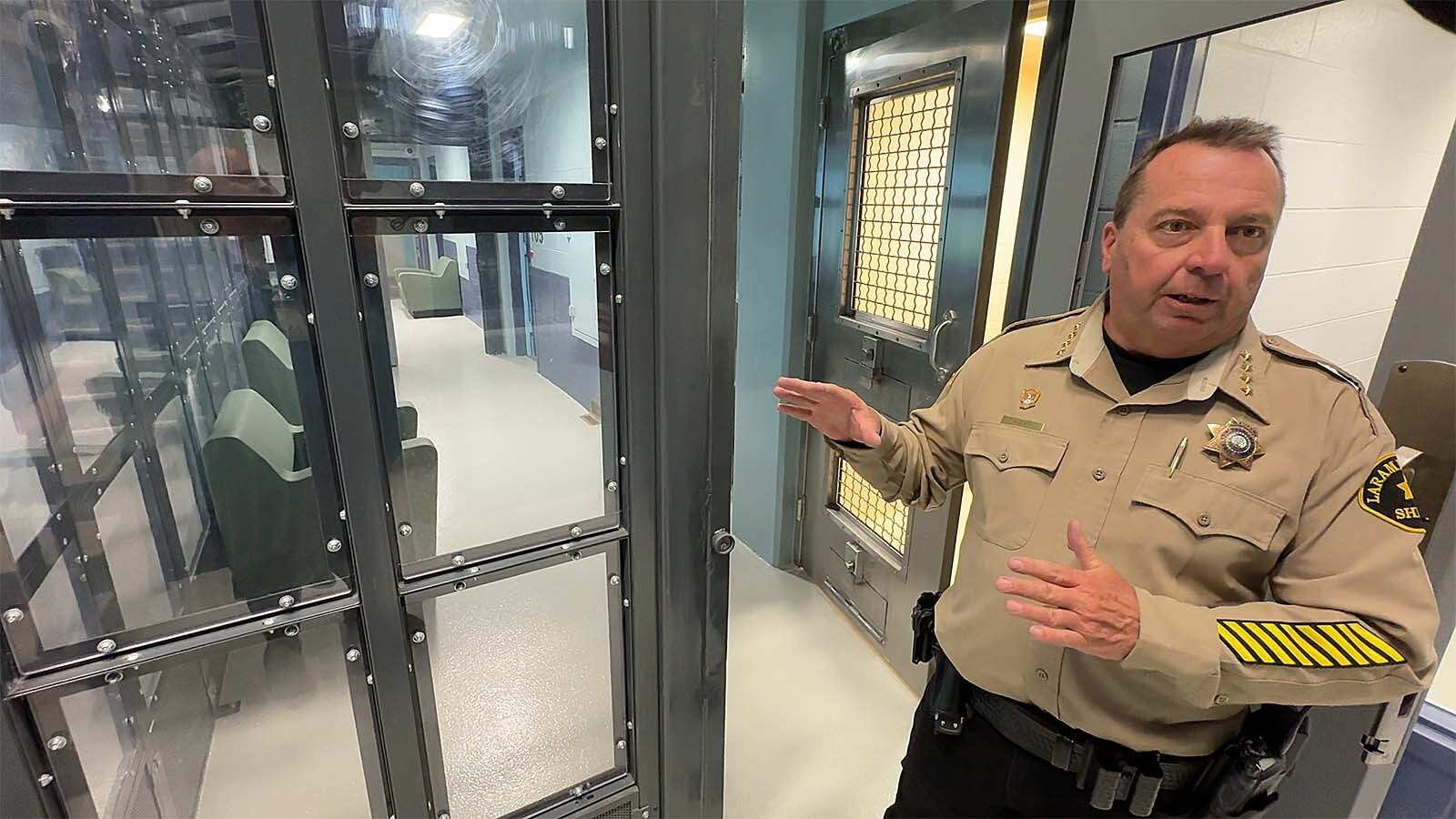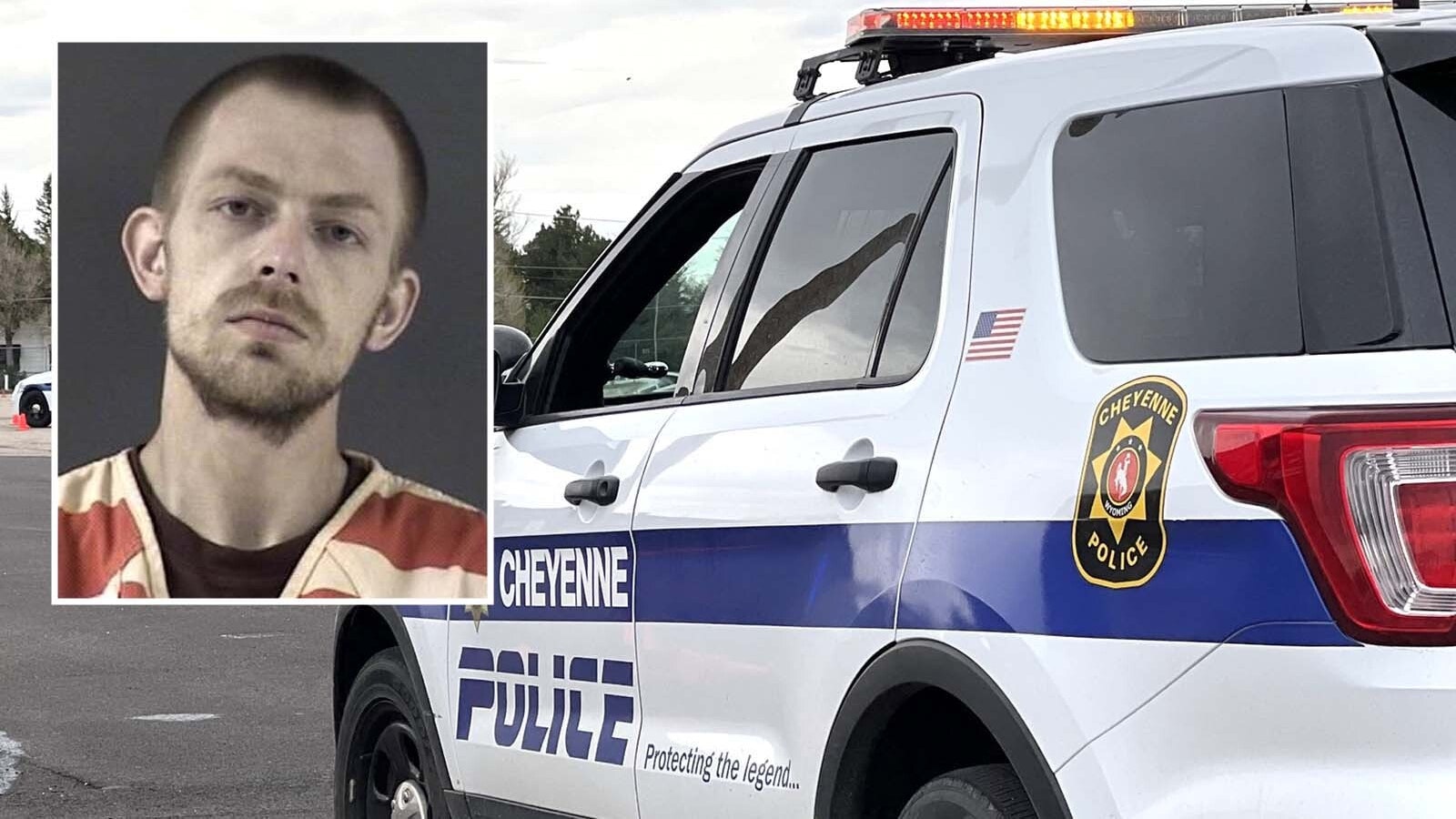A Wyoming police sergeant urged state legislators Thursday to set aside money for teaching officers about the Fourth Amendment.
Casper Police Department Sgt. Jake Bigelow, who said he was speaking as an individual and not an agency representative, cited recent headlines as proof that Wyoming’s law enforcement officers may be rusty on search and seizure issues. He made his comments during a Thursday meeting of the legislative Joint Judiciary Committee in Cheyenne.
He also noted that he works for national police training company Blue to Gold.
Bigelow specifically referenced Wyoming’s $127,500 settlement payout to Myron Martize Woods, who sued three now-former Cheyenne Police Department agents after they rushed into his home, wrestled with and arrested him without a warrant in 2020.
Bigelow also vaguely referenced “an officer being shot and almost killed,” a characterization that fits a 2023 incident in which a Thermopolis Police Department sergeant broke into a suspect’s home, was shot through the lung and fired back, killing the suspect.
Shortfalls In Training
He said officers also have been losing jobs and prosecutors have been losing cases due to ill-gotten evidence or arrests, and that these highlight what Bigelow called shortfalls in Fourth Amendment training at the Wyoming Law Enforcement Academy.
"These violations aren’t happening because officers are rogue or malicious," said Bigelow. "They’re happening because officers are not being given the knowledge and tools they need to consistently make constitutionally sound decisions."
Specifically, the sergeant said he’s surveyed agents statewide and heard that the academy is teaching Fourth Amendment law via “conflicting opinions” and different instructors.
He proposed that Wyoming Peace Officer Standards and Training (POST) make a rule requiring Fourth Amendment training as part of officers’ continuing education during their careers. He also asked the Wyoming Legislature to fund that requirement.
“Officers are being failed by this lack of training and the citizens of Wyoming are paying the price,” said Bigelow.
Many small departments can’t pay for the continuing education they need, he added.
“Let’s give them the training they need to protect our citizens and uphold the Constitution,” said Bigelow, adding that he’d be happy to help with curriculum, planning or any other area where he may be of use.
Academy Counters
The Wyoming Law Enforcement Academy’s top officials countered Bigelow’s characterization of the issue in a Friday interview with Cowboy State Daily.
Academy Director Chuck Bayne said he didn’t know the Woods or Thermopolis Police Sgt. Mike Mascorro case intimately enough to speculate on their root causes. Mascorro was shot and killed a suspect after breaking into the suspect’s home. A special prosecutor later concluded Mascorro entered the home improperly.
Consistent and continuous training for law enforcement officers throughout their careers is “not a bad thing,” but it’s challenging to pin one area of study as mandatory for everyone with so many different topics involved.
“There are a lot of topics and areas that we could focus on throughout that officer’s career, search and seizure being one of those,” said Bayne. “Every expert in every one of those topics could have the same perspective Sgt. Bigelow has — that my topic is the most important and we need more training.”
Bigelow did tout search and seizure case law as highly important, calling it an officer’s “playbook” for policing and foundational to his daily interactions.
As for whether POST should mandate continuing Fourth Amendment education, Bayne said he’d leave it to POST Director Chris Walsh to opine on that.
Walsh did not respond by publication time to a Friday voicemail request for comment, but in the committee meeting he said Fourth Amendment training is “critical” and that a POST rule, not state law, would be the right avenue to mandate it.
Practical Application
Bigelow also told the committee Thursday that he believes the academy should eliminate its online curriculum on the topic and use in-person, vetted training processes and practical application.
The academy disagrees.
To cut down on classroom lecture time and make students engage more closely with a set of lessons and questions, the academy has adopted some individual study programs in recent years, said Bayne.
He clarified that he doesn’t call these “online” education because not all of the individual study happens online.
The academy teaches 38 topics that are Fourth Amendment-related. Sixteen of those use an online platform (but many of those also incorporate other, hands-on portions like team exercises). And 22 of them use an in-person platform, Academy Deputy Director Jesse Curtis told Cowboy State Daily in a Friday interview, which he shared with Bayne.
It’s working, Bayne said.
“We’ve shown an increase in test scores and retention of material using our training approach, and being much more efficient,” he said.
Character
Agencies still see some high-performing academy graduates become underwhelming cops, Bayne said. He attributes the gap to a change that happens in a person’s mind when he knows he won’t face a lethal situation versus when he knows he may.
There’s no foolproof way to teach every officer to perform well in a potentially lethal situation, he said, indicating that the distinction could boil down to the contents of each person’s character.
Let Me Shoot
Bayne found some common ground with Bigelow in the assertion that not all officers are going to choose continuing education classes they need: they may choose classes they simply prefer.
“If I put on advanced firearms (classes), I’m going to get a lot of people to sign up for that,” Bayne said. “If I’m going to put on a report-writing class, which is as critical as anything, I’m not going to get anyone to show up.”
The law enforcement sector has done “numerous” things to help with that, but in Wyoming, policy-makers and local agencies are particular about maintaining local control, he said.
Without opining on the merits of the state’s policy choices, Bayne presented a quandary: To fill the gap Biglow perceives, the state would have to mandate mid-career Fourth Amendment training, risking the erosion of Wyoming lawmakers’ dearly held local control values. But for the state to simply fund the extra training without mandating it is to risk officers continuing to be disinterested.
Like Bigelow, Bayne noted that law-enforcement agencies have to foot the bill for their agents’ continuing education. The state only pays for their basic training, he said.
Breaking In
The Fourth Amendment to the U.S. Constitution promises the right of people to be secure in their homes and possessions against unreasonable searches and seizures, and to be subject only to warrants issued upon probable cause.
It carries immense case law, which goes so far as to address specific instances, like whether an officer can thrust his arm into a home to prevent a door being slammed in his face.
Both Woods’ case and the Thermopolis officer-involved shooting invoked the Fourth Amendment.
Woods’ case didn’t reach a conclusion in civil court (though the man’s related criminal conviction was overturned), but a federal judge called the officers’ behavior “concerning” and was prepared to send most of the case to trial before the parties settled.
The officer-involved shooting in Thermopolis happened in April 2023, after Mascorro broke into the home of a suspect who had slammed the door in his face, triggering a gunfight in which Mascorro was shot through the lung and he shot the suspect to death.
Mascorro didn’t have a warrant for the misdemeanor-level arrest he wanted to perform, and he didn’t have exigent circumstances justifying his break-in, the special prosecutor overseeing the case later concluded.
But he wasn’t legally culpable for homicide in the suspect’s killing because of a provision of Wyoming law protecting officers while they’re on the job.
Clair McFarland can be reached at clair@cowboystatedaily.com.





